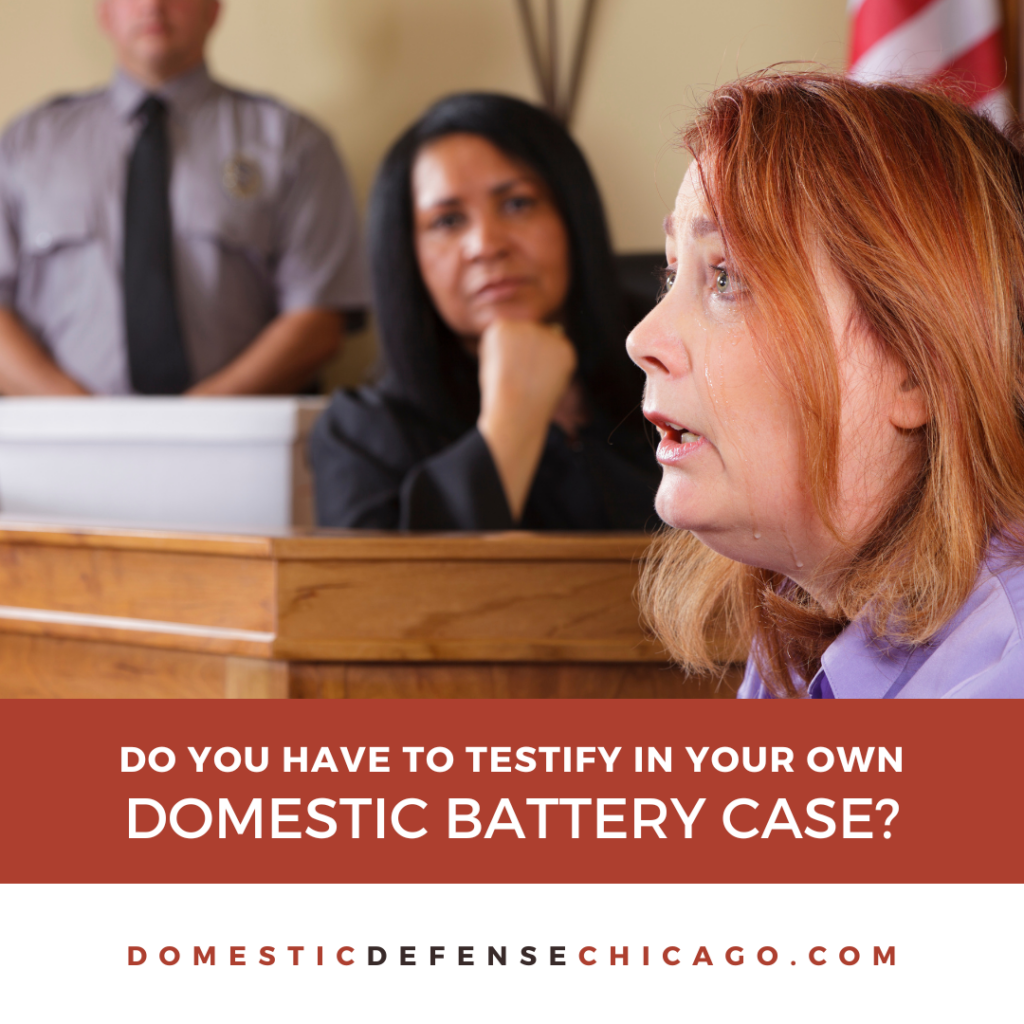Facing a domestic battery charge can be a challenging and stressful experience. One common question is whether you have to testify in your own case. While you are not required to testify, following your lawyer’s guidance is essential to ensure the best possible defense.
Do You Have to Testify in Your Own Domestic Battery Case?
No, you do not have to testify in your own domestic battery case. The Fifth Amendment to the U.S. Constitution protects you from self-incrimination, meaning you have the right to remain silent and not testify against yourself. This guide explains the following:
- Your right to remain silent
- The potential risks and benefits of testifying
- How to decide whether to testify
- The importance of following your lawyer’s guidance
Here’s a closer look at each.
Your Right to Remain Silent
The Fifth Amendment provides you with the right to remain silent and not testify in your own defense. This right is designed to protect you from self-incrimination and ensures that you are not compelled to provide evidence that could be used against you. Exercising this right can prevent the prosecution from using your words to build their case. Remember that choosing not to testify cannot be used as evidence of guilt.
Related: Domestic battery defense information
The Potential Risks and Benefits of Testifying
Testifying in your own defense carries both risks and benefits.
Benefits:
- You have the opportunity to tell your side of the story directly to the judge or jury.
- You can provide context and details that may not be apparent from the evidence alone.
- Your testimony can humanize you and potentially generate sympathy from the judge or jury.
Risks:
- Cross-examination by the prosecution can be intense and challenging.
- The prosecution may attempt to twist your words or use your statements against you.
- If you appear nervous, inconsistent, or dishonest, it could harm your credibility and negatively impact your case.
How to Decide Whether to Testify
Deciding whether to testify is a critical decision that should be made in consultation with your lawyer. Consider the following factors:
- Strength of the Prosecution’s Case: If the prosecution’s case is weak, it may be better to avoid testifying and let the burden of proof remain on them.
- Your Credibility: If you have a history that could be damaging under cross-examination, it might be wiser not to testify.
- Evidence and Witnesses: If your defense has strong evidence and credible witnesses to support your case, testifying may not be necessary.
Related: Can you plead not guilty to aggravated domestic battery?
The Importance of Following Your Lawyer’s Guidance
Following your lawyer’s guidance is crucial in making the decision to testify. Your lawyer will assess the strengths and weaknesses of your case and advise you on the best course of action. They have experience with courtroom procedures and understand how your testimony might be perceived by the judge and jury. Trusting your lawyer’s expertise can help you make an informed decision that protects your rights and supports your defense strategy.
FAQ About Testifying in Domestic Battery Cases
Check out these commonly asked questions about testifying in domestic battery cases in Illinois. If you don’t see your question here, please call our office and we’ll find you the answers you need.
Do I Have to Testify in My Own Defense?
No, you do not have to testify in your own defense. The Fifth Amendment protects your right to remain silent and not testify against yourself.
What Are the Risks of Testifying in My Own Case?
The risks of testifying include being subjected to cross-examination, having your statements used against you, and potentially harming your credibility if you appear nervous or inconsistent.
What Are the Benefits of Testifying in My Own Case?
The benefits of testifying include the opportunity to tell your side of the story, provide context and details, and potentially generate sympathy from the judge or jury.
How Should I Decide Whether to Testify?
You should decide whether to testify in consultation with your lawyer. Consider the strength of the prosecution’s case, your credibility, and the evidence and witnesses available to support your defense.
Related: Can you modify an order of protection?
How Can a Lawyer Help With My Decision to Testify?
A lawyer can help by assessing the strengths and weaknesses of your case, advising you on the potential risks and benefits of testifying, and providing guidance on the best course of action to protect your rights.
Do You Need to Talk to an Attorney About Domestic Battery Defense?
If you need to talk to a domestic battery defense attorney in Illinois, we’re here to help. Call us at 847-920-4540 now – we’ll be happy to give you a free consultation and talk to you about your options.







Leave A Comment
You must be logged in to post a comment.